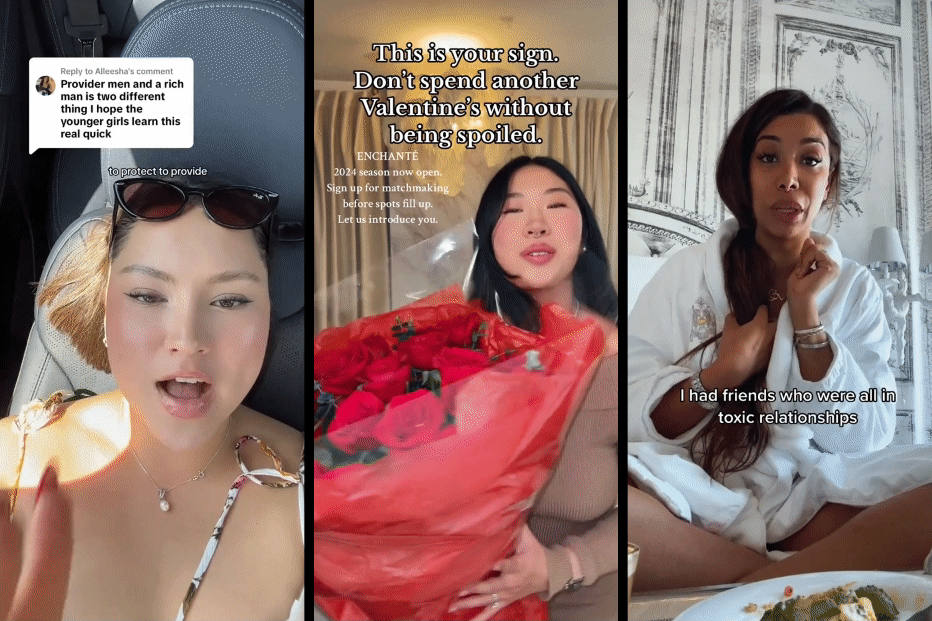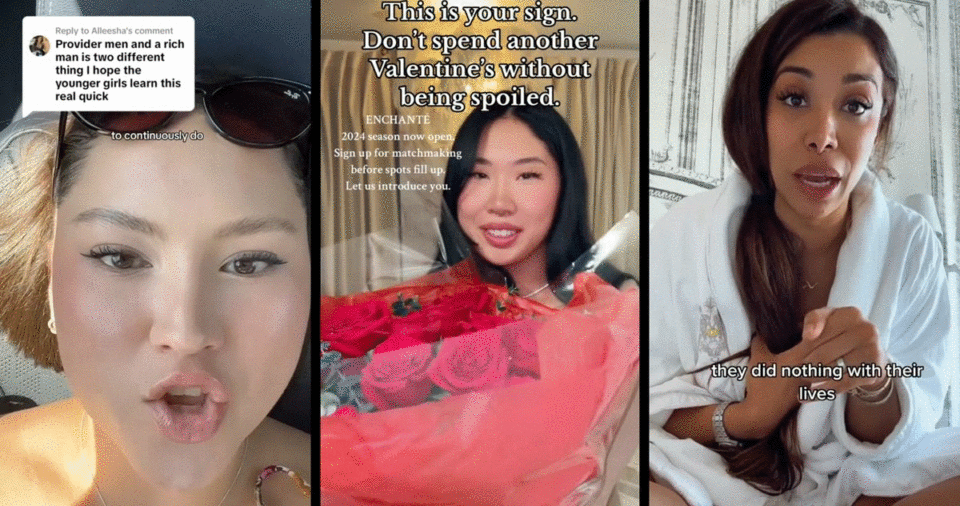[ad_1]

In 2022, Karla Elia was 22 and desperate to leave her parents’ house. She was disillusioned with school — it would only put her in debt, anyway — and tired of her job as a leasing agent for a rental property in San Diego. Her solution? Find a man who would provide for her. On Bumble, she met a 24-year-old in the military. Out on dates, she made it a point never to talk about her past, only how he fit into her future dreams; he showed her his credit and savings account, and Elia decided she could live within his means. Four months later, they were married. She sat in her car and recorded her revelations. “I just said, Ladies, I found a way for you to attract the man of your dreams,” Elia tells me. The video went viral. Elia completed a “relationship-coaching program” and started selling her expertise online. Though she doesn’t believe in contributing to the household bills, she couldn’t help but capitalize on the business momentum. “I said, this is a great opportunity for me to serve women and make it my long-term career,” Elia tells me. “What better ways to spend my days of —” she puts it in air quotes — “work?” Her follower count rose to 1 million.
This kind of advice is now everywhere. Women all over your “For You” page urge you to find a man willing to provide so you can leave behind some of your daily tribulations and exhale into a more comfortable life. The gist of what they’re shilling is simple: The “high-value” provider man does everything for his partner; in turn, she has the freedom to live a soft life. She can work or not work. She can, as Elia puts it, “finally have time to be a philosopher.”
On TikTok, provider-speak doesn’t always mean bagging a rich guy. Sometimes, it’s just about finding someone who will love you and do anything to support you. Elia, whose provider falls into the latter camp, teaches clients how to stop being millennial-coded “Boss Babes” who are unsustainably dedicated to work and transition into “Empire Queens” who delegate instead of doing it all by themselves.
Sahar Khorramnezhad, or @SisTalksWithSahar on TikTok, was a corporate lawyer in New York when she met her now-fiancé, a financial analyst, in 2021. She quit a few months later. “I was so miserable; my partner looked at me and was like, you hate doing this,” Khorramnezhad recalls. “He said, just quit, I got you, take time to figure out what it is that you want to do.” For eight months, she didn’t work at all. Then she returned to school at Columbia to get a master’s degree in family law.
Around the same time, she started a TikTok where she doled out the legal info she learned in her classes. Soon, she had a following of a half-million who were just as interested in her take on prenups as they were about her relationship advice (hashtagged hypergamy) and suggestions on where to find rich men (Art Basel, SXSW). People call her a gold digger in the comments, or come up to her fiancé in real life and tell him he should get a prenup. Khorramnezhad doesn’t care. And why should she? When everyone wants to get rich — or at least seem like it — what’s the problem with a little transparency?
“The first thing a man will do when you talk about money is call you broke, uneducated, and ugly,” Khorramnezhad says. “I’m not ugly, I’m not broke, I’m not uneducated.” A member of the bar in both California and New York, she tells me she makes more than half the men in her comments section. “And to be honest,” she adds, “most of them would give their life savings to lie in bed with me.”
It’s easy to see this dating advice as evidence of a bleak and sexist regression. But many influencers are also simply cashing in on followers’ growing appetite for wealth. Before Sarah Allison, or Malibu Toast, wiped her socials in May (part of a “spiritual surgery,” she says), she made popular TikToks about being a trophy girlfriend in Palm Beach and shared billionaire travel schedules so that you might conveniently find yourself vacationing in St. Barts or perusing the Monaco yacht show at the same time as wealthy prospects. “Anytime you throw ‘billionaire’ into something, it’s probably going to go viral,” she says.
Drawing in part from her experience as a hostess at SoHo House, matchmaker Tiff Baira rose to prominence during the pandemic for making videos about where to find a sugar daddy in the city. Mimi Shou built a platform on TikTok by sharing stories of her New York dating adventures and pursuit of finance bros. “NYC Luxury Dating Coach” May Kalinu’s schtick is helping women of color marry into “old-money” families to create generational wealth for their children. Kalinu, who is 27 and lives with her tech fiancé in Gramercy Park, tells me that men paying for most expenses helps balance out the “extra things that women go through in society, like the pink tax for razors.”
The reigning queen of the high-value dating movement is Texas-based YouTuber Leticia Padua, or Shera Seven as she’s known online. The former mortician and mother of two is married to a software developer and has been vlogging for over a decade about everything from her life in Houston to her love of Michael Jackson, but she rose to niche online fame in recent years for her advice encouraging women to stop dating broke “dusty” men and instead aim richer and older. You should marry for money, she says — and then, hopefully, grow in love. Save up your own income and stop being “Bob the Builder Chicks” who build men up and split bills with them. And don’t be “Pickmeishas,” desperate to be chosen by a man even if he doesn’t have money. She caps off her lessons with the catchphrase “sprinkle sprinkle,” and her advice has inspired countless “No More Dusties” and “Sprinkle Sprinkle” clubs on Facebook.
Her nihilistic (and fun) approach pares marriage back to its business-arrangement bones; men, she teaches, are destined to disappoint you, so you may as well walk away with a bag in the process. Any woman can get a job, she says. A husband who pays the bills is real power. And while he does that, “you can be free.”
Before these videos, Katrina, a 31-year-old Philadelphia-based marketing professional, used to walk into bars looking for love. “Now, I’m looking for Rolexes,” she says. Katrina — who asked to go by a pseudonym for this story — found Shera Seven on TikTok during the pandemic while she was in the last dregs of a two-year situationship with a “dusty” who lived with his grandmother, made $8 an hour, and treated Katrina badly while she helped him get on his feet.
“I was, like Shera said, a pickmeisha,” says Katrina. Shera and her therapist both gave her the same advice — her man should take care of her, not the other way around — but Shera’s brusque delivery stuck, reminding Katrina of her mother, a quick-witted Pisces. While she used to say “yes” to any man who approached her at the Cheesecake Factory, she now hangs out exclusively at swanky bars. And she’s seeing returns: A few months back, a man she was seeing flew her and some friends out to Miami, showered them with lobster and Dom Perignon, and CashApped Katrina $500 for her company. “That’s another thing Shera says — you don’t have to do anything, you don’t have to say anything, you don’t have to help him apply for jobs,” Katrina says. “Just show up, look beautiful, and his worth shoots up.”
Since following Shera, Jasmine, a 31-year-old IT tech in Houston, has gotten better at filtering out men who don’t put in effort, but she keeps her love for the influencer a secret from conservative friends who don’t agree with the sprinkle-sprinkle approach and think Shera is teaching women “how to be whores” by encouraging them to talk about money. “There’s a saying in the South, people get real funny about they money,” Jasmine says. But when she looks at siblings who provide for their families while also bearing the brunt of child care, she’s not convinced they’re happy, either — so why turn down a date to the third row of the World Series?
While she used to say “yes” to any man who approached her at the Cheesecake Factory, Katrina now hangs out exclusively at swanky bars.
Katrina doesn’t want to stop working. Her ideal soft life doesn’t involve a man paying for 100 percent of the bills — just most of them. She simply wants a man who will pick up the slack when she’s pregnant and postpartum, who will let her take time off to heal. “I just want someone to provide that option for me,” she says. “And also pay for all my vacations and dates. And give me Cartier just because.”
Are dating influencers actually helping their clients marry into the one percent? Kalinu tells me she’s coached more than 300 women, and a confidential dating session with her costs $300. (And though she often posts about buying Dior bags and flying private, she — like many of the influencers with whom I spoke — wasn’t willing to disclose how much money she actually makes from these offerings). It’s unclear if her clients have bagged old money, but she tells me she did work with a project manager who, after a couple months of coaching, had a random man help her carry her groceries down the street.
And some who have made these videos don’t take them seriously. Sarah Allison calls her old high-value dating content “superficial fluff” to draw women in to do “deep work” with her. (I attended one of her free self-improvement sessions to see what that deep work was about: On a Zoom call of about 75 participants, a handful told Allison their deepest insecurities, which she then repeated back to them in the voice of their inner critic.) Tiff Baira says her videos about hunting for rich men are satirical. Mimi Shou said the same of her videos about looking for guys in finance: “If you can’t tell it’s a joke, that’s your problem.”
During her time off from work, Khorammnezhad tried to live the soft life. If she was someone who didn’t need to be “intellectually stimulated,” she says, she could have spent her time doing Pilates, having dinner parties, and twiddling her thumbs. But all of that bored her. The idle time was bad for her clinical depression. Her fiancé came home with interesting tidbits to share from meetings and conferences. “I just didn’t,” Khorammnezhad says. She went back to work two months ago, this time specializing in high-net-worth prenups, divorce, and custody arrangements at a Los Angeles firm. The nine-to-five is still miserable, she tells me, but it’s fulfilling. The legal advice she gives to clients is the same as what she dispenses online, but if rich men are all you’re after, she warns there’s only so many of them to go around. “It’s called the one percent for a reason: There’s only one percent.”
And are these influencers’ lives as perfect as they present them to be? Their fans have to take their word for it. Last year, Khorramnezhad left TikTok after followers dug too deeply into her and her fiancé’s personal lives. “There was an obsession with disproving things about me; they wanted to be like, you’re not happy,” says Khorramnezhad. “No one’s happy all the time.” TikTok doesn’t pay her bills, but she recently returned to the platform to show women the perspective of someone who quit a high-powered job, lived the soft life for a while, and ultimately left it behind. “I’m trying to show what it looks like to be with someone wealthy but also have your own thing going on,” she says. “And I’m good at it.”
Even the most-provided-for women acknowledge the importance of backup plans. Last December, Karla Elia got slammed by followers after posting a series of videos about how her mother got involved with a married man; what she’d painted as a story of a romantic win her audience saw as home-wrecking. Now, she offers self-improvement courses with religious overtones: For a onetime payment of $150, you can break your “hypermasculine programming” to become the virtuous Proverbs 31 woman who rises in the night to feed her household. And, in case that doesn’t work out, she’s also returned to school, studying to become a legal translator — maybe even to provide for herself.
Related
- Is Everyone Dating Pathological Liars Now?
- Who TF Is Reesa Teesa Now?
- Can You Teach a Girl to Flirt?
[ad_2]
Bindu Bansinath , 2024-05-31 13:00:08
Source link



